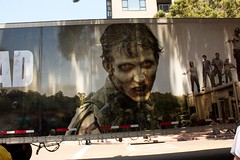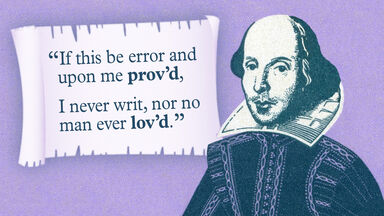Simile

Compares two things using "like" or "as"
The milk was as curdled AS cottage cheese.
Creates
imagery of lumpy, stinky milk.
Metaphor

Says that one thing IS something else
"There's a
fire in my heart and you fan it, Janet." (Rocky Horror Picture
Show)
Emphasises the passion Rocky feels for Janet. (His
heart aches like it is on fire. Her beauty makes it hurt/burn more.)
Alliteration

When the first sound of two or more words is the same.
Peter Piper picked a peck of pickled peppers.
The
repetitive plosive /p/ sound makes Peter sound quite busy Picking
those Peppers! (like fast breathing/exhaling.)
Allusion

When the text refers to another person, place, text.
When John said "I have a dream..." in his student rep
speech, he was alluding to Martin Luther King, Jr's speech. He used
this to try and give his speech gravity/seriousness.
Assonance

The repetition of internal vowel sounds.
The thUnder
rUmbled all night long.
The deep "UH" sound
reinforces the long, deep rumbling of the thunder.
Cliche

An expression that has been overused, but now everyone knows what it
means.
I'm so hungry I could eat a horse!
This one lets you know that I am VERY hungry!
Connotation

The feeling that goes with the word (not what the word actually
means).
Your room is a PIGSTY!
You
understand that your room is very dirty, not that you have been moved
to the barn.
Ellipsis

The use of three full stops (...) to show something has been omitted
(left out) or that time has passed.
"Four years
later..." or "He went to the store ... and also bought birdseed."
Emotive Language

Words that give us a "gut feeling" like love, hate, or terrorist.
Hyperbole
(hy-PER-bole-lee)

Exaggeration, often used as humour, for effect.
I will
DIE if she doesn't ask me to dance.
Juxtaposition
To put things side by side (sometimes they don't look like they
"go" together).
The BABY DADDY on "16 and
Pregnant" tends to run off in the end because he can't take the
responsibility.
Putting together Baby and Daddy creates
a third concept.
Neologism
(neo = new)
To create a new word.
He's so SKUX!
The
new word becomes accepted and eventually is no longer a neologism.
Email was once one of these.
Onomatopoeia

Words that sound like what they mean.
Sizzle, buzz, moo, purr.
Oxymoron

Two words that don't "go" together (contradictory words),
put together to give a new meaning.
The living dead;
seriously funny.
First Person Point of View (POV)
Characterised by the use of "I," "me,"
"my."
The girl turned and looked directly into
my eyes.
Limits the story to just what that character
sees, hears, knows. Potential to be unreliable.
2nd Person POV
Characterised by "you."
"You are at a
nightclub talking to a girl with a shaved head." (Bright Lights,
Big City)
Intended to create intimacy between narrator
and reader, but can also make the reader feel powerless.
3rd Person POV
Characterised by "he" or "she." Can be omnipotent
or limited.
She glanced, sideways, at the old couple.
Perhaps they would go soon. Last Sunday, too, hadn't been as
interesting as usual. An Englishman and his wife, he wearing a
dreadful Panama hat and she button boots. And she'd gone on the whole
time about how she ought to wear spectacles; she knew she needed them;
but that it was no good getting any; they'd be sure to break and
they'd never keep on. And he'd been so patient. He'd suggested
everything--gold rims, the kind that curve round your ears, little
pads inside the bridge. No, nothing would please her. "They'll
always be sliding down my nose!" Miss Brill had wanted to shake
her. ("Miss Brill," by Katherine Mansfield)
Pun
Playful device where words with different meanings are used (or one
word with several meanings).
I'm so good at sleeping,
that I could do it with my eyes closed! (hahaha)
Synonyms
Words that have SIMILAR (but not always the same - remember
"connotation?") meanings.
Wonderful, Terrific, Fantastic.
Antonyms
Words that have opposite meanings.
Terrific, Awful.
Good, Bad. Nice, Mean.
Theme
The main idea. Be very careful when considering this; it is not one of the examples IN the text, but the overall view of the text itself.
Tone
The overall "feeling" of the piece, based on the word choice. Is he serious? Comic? Ironic?
Colloquialism
Slang that is particular to a location.
Hey - will you
SHOUT me lunch?
New Zealanders use "shout,"
but you would not hear this expression in the United States. These
can help establish setting.
Slang
Casual, informal language. Often linked to young people, or a
particular sub-culture.
Yeah, bro, I get you.
A writer uses informal language to try and reach his audience on
their level, so it doesn't seem like he's talking down to them.
Imperative
A command, often seen in advertising.
Don't delay - buy
now!
These encourage you to take action. Can also be
seen in persuasive writing, when the author makes a "call to
action" near the end of the piece.
Repetition
The use of words/phrases more than once (on purpose, not because they
can't think of a synonym).
I have told you, over and
over and over, how important it is to do your homework.
Adds conviction to what is being said. Particularly effective in
oral texts.
Jargon
Similar to slang, except this language is used within a specialist
field.
For example, computer technicians don't say
"turn it on," they say "boot it up." They don't
say "turn it off," they say "shut it down."
Used to set a group apart, or identify with a certain group.
Euphemism
Used to make less-nice concepts acceptable to certain audiences.
For example, you wouldn't say, "Hey, I hear your
old man kicked it." You would, because it is more polite, say:
"I'm sorry to hear your father PASSED AWAY."
But euphemisms can also be funny: kicked the bucket, sucked a
kumara, took a dirt nap, turned toes up, etc. Humour can help take the
sting out of a painful situation.
Listing
Using several items in a row, often in the same form (like -ing words
in this sample).
The car kept travelling, rolling,
trundling down the road, even without a driver!
The use
of this technique adds detail that reinforces a concept - the car
kept going, although slower and slower, even though there was no one
piloting it.
Minor sentences
A short, purposeful sentence without a subject, or without a verb.
Often the missing bit is unspoken, but understood.
"Three." (meaning: It's three o'clock."
Often used to create the effect of a real conversation.
Stereotypes
Easily identifiable.
Kiwi Male: wears gumboots, shorts,
and doesn't say much.
Nurse: wears white; is caring,
helpful, nice.
Often used in advertising. Sets scene very
quickly. Very simple message.
Elision

the omission of a sound or syllable when speaking (as in I'm, let's )."the shortening of words by elision"
the process of joining together or merging things, especially abstract ideas. "unease at the elision of so many vital questions"
A good way for poets to set metre. Also used for dialects in dialogue, as well as setting the tone of casual conversation.
Litotes
Deliberate use of understatement. Very common in NZ culture.
Q: How was dinner?
A: It was ok. (Means: It was good, I'd
eat it again.)